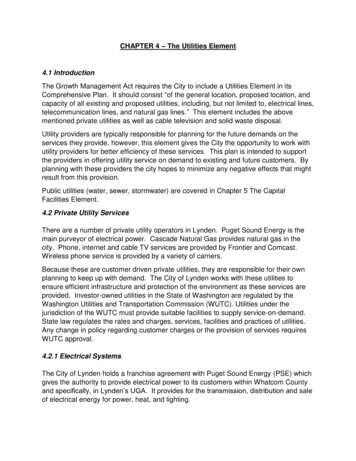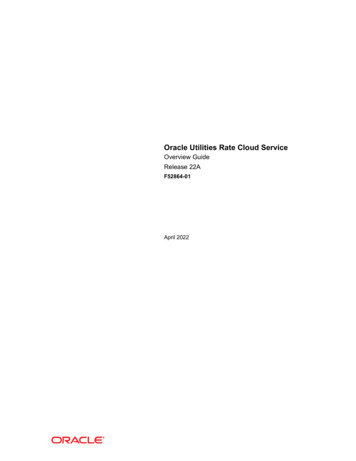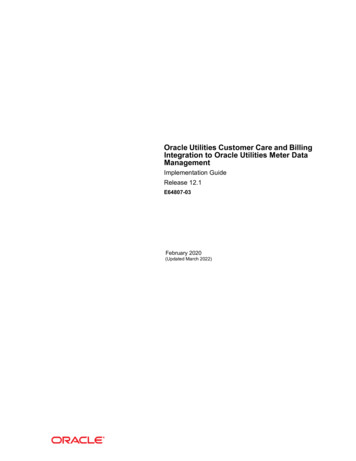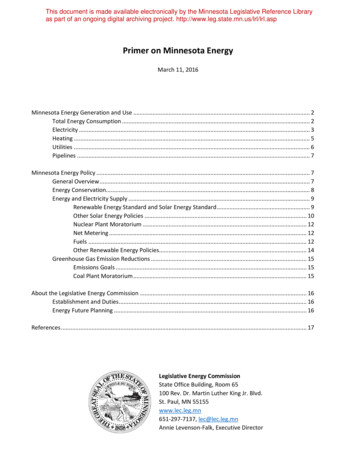
Transcription
CHAPTER 4 – The Utilities Element4.1 IntroductionThe Growth Management Act requires the City to include a Utilities Element in itsComprehensive Plan. It should consist “of the general location, proposed location, andcapacity of all existing and proposed utilities, including, but not limited to, electrical lines,telecommunication lines, and natural gas lines.” This element includes the abovementioned private utilities as well as cable television and solid waste disposal.Utility providers are typically responsible for planning for the future demands on theservices they provide, however, this element gives the City the opportunity to work withutility providers for better efficiency of these services. This plan is intended to supportthe providers in offering utility service on demand to existing and future customers. Byplanning with these providers the city hopes to minimize any negative effects that mightresult from this provision.Public utilities (water, sewer, stormwater) are covered in Chapter 5 The CapitalFacilities Element.4.2 Private Utility ServicesThere are a number of private utility operators in Lynden. Puget Sound Energy is themain purveyor of electrical power. Cascade Natural Gas provides natural gas in thecity. Phone, internet and cable TV services are provided by Frontier and Comcast.Wireless phone service is provided by a variety of carriers.Because these are customer driven private utilities, they are responsible for their ownplanning to keep up with demand. The City of Lynden works with these utilities toensure efficient infrastructure and protection of the environment as these services areprovided. Investor-owned utilities in the State of Washington are regulated by theWashington Utilities and Transportation Commission (WUTC). Utilities under thejurisdiction of the WUTC must provide suitable facilities to supply service-on-demand.State law regulates the rates and charges, services, facilities and practices of utilities.Any change in policy regarding customer charges or the provision of services requiresWUTC approval.4.2.1 Electrical SystemsThe City of Lynden holds a franchise agreement with Puget Sound Energy (PSE) whichgives the authority to provide electrical power to its customers within Whatcom Countyand specifically, in Lynden’s UGA. It provides for the transmission, distribution and saleof electrical energy for power, heat, and lighting.
PSE has nearly 100,000 customers in Whatcom County, more than 1,100 miles ofoverhead distribution lines, 700 miles of underground lines, and more than 200 miles ofhigh-voltage transmission lines. There are 35 distribution substations and 9transmission substations in Whatcom County.A majority of PSE’s generating capacity comes from hydropower projects, including theUpper Baker dam in eastern Whatcom County. Other power-generating facilities inWhatcom County include 4 natural gas plants and 3 anaerobic digester plants on localdairy farms. Much of the region’s overall power is transmitted from Canada and otherparts of Washington on highvoltage lines largely owned by the Bonneville PowerAdministration. While PSE generates some of its own power, it also purchases powerfrom other facilities.PSE maintains an adequate level of service throughout Whatcom County and iscontinually maintaining and upgrading its service infrastructure as needs are perceived.At this time, no deficiencies exist or are expected to exist within the planning period.Finally, PSE actively promotes energy conservation methods with its customers, itconnects local customer-owned generation systems to its grid (ie. rooftop solar). Manyof its customers participate in its Green Energy Program which provides grants for highvisibility solar projects in the region. PSE also sponsors educational programs thatadvocate for energy efficiency and conservation and a continual increase in renewableenergy opportunities.4.2.2 Natural GasCascade Natural Gas (CNG) Corporation is an investor owned company that providesnatural gas service to the City of Lynden. It is regulated by several agencies. TheWashington Utilities and Transportation Commission regulates the rate and chargesimposed on customers. CNG must also meet requirements established by the NaturalGas Policy Act of 1978 and alternative electricity generation policies of the NorthwestPower Planning Council.CNG is a customer driven utility so they expand their services based on currentdevelopment needs. Their system fully meets existing demand. As Lynden grows,CNG is reactive to on-the-ground development. If upgrades or increased capacityneeds are required as development occurs, they make those upgrades accordingly.CNG is meeting the existing conditions and demands for natural gas. It is likely thatdemand for natural gas will continue to increase during the planning period as it isconsidered a “cleaner” heat source than other fossil fuel sources. As the region worksto deal with the impacts from a changing climate, the demand for natural gas will likelyincrease.
CNG is able to respond to increasing demands based on market factors. When afacility is reaching its capacity they may extend services by:1) Increased distribution and supply pressure on existing lines2) Adding new distribution and supply mains for reinforcement3) Increasing existing distribution system capacity by replacing with larger mains4) Adding district regulators from supply mains to provide sources for meeting theneeds of new development4.2.3 Internet Access and TelecommunicationsBased on the last 20 years, it is likely that no other private utility will see more changesin the next 20 years than internet and telecommunications. Since Lynden’s original 1995Comprehensive Plan, the internet has radically impacted daily life. High speed internetservice is now an essential utility for both business and residential life.Currently, there are several options for residents to subscribe to internet service andmuch of it is based on customer choice to meet their own needs. Many municipalitiesare still considering the most effective way to ensure that their residents have affordableaccess to high speed internet. During this planning period, Lynden will need to consideradditional methods for increasing and improving access. One method that somemunicipalities are using is offering public wifi networks that residents and businessescan access. Furthermore, Lynden should consider development regulations that requirenew development to include fiber-optic infrastructure within the public right of way andthen replace or add that infrastructure to old right of ways as street improvements occur.Mobile phone devices were relatively rare in 1995. Today more than 90% of Americanadults own a mobile phone and a large majority of those are “smart phones” which areable to access the internet. Mobile phone devices are now ubiquitous and the next 20years are sure to bring many changes to these devices.The popularity of mobile phones has resulted in a dramatic decline in land line phones.At the time of the last Comp Plan update in 2004, 90% of homes had land line phoneservice. In the decade since, that number has decreased to close to 50%. Thatnumber is sure to continue its decline.4.2.4 Cable TelevisionCable television service is often provided by the same internet and phone providers.Comcast and Frontier Communications provide cable service, while DirectTV and DishNetwork provide satellite television service. These companies provide service in acompetitive environment and no deficiencies currently exist. In the next 20 years, theseservices will likely change in many ways reacting to customer demand and providingadequate levels of service to their customers.
4.2.4 Solid Waste DisposalThe City of Lynden does not possess its own solid waste disposal facility, however, it isserviced by Nooksack Valley Disposal (NVD) under a franchise agreement with the city.NVD is located at 250 Birch Bay-Lynden Road and services the city’s UGA. NVDfollows the plan laid out by the Whatcom County Solid Waste Comprehensive Planwhich was a cooperative effort between Whatcom County and several of the citieswithin the County.NVD is a collection company with a dropbox/transfer facility that provides garbage,recycling, and yard waste pickup for its customers. NVD delivers its garbage collectionto Recycling and Disposal Services, Inc, a transfer facility in Ferndale, WA. From thereit gets transferred to a landfill in Arlington, Oregon where the climate is suitable for asolid waste landfill. The traditional recycling material (paper, cardboard, glass, cansand plastic) is delivered to Northwest Recycling in Bellingham for processing. The yardwaste pickup is delivered to Green Earth Technology, just outside of Lynden where theymake a high quality mulch product.NVD is meeting the current solid waste disposal demands and has room for theexpected population increase. As with other private utilities, NVD is customer drivenand meets demand as development occurs. NVD currently serves 3,650 homes withgarbage and recycling pickup. Just over 40% of those also subscribe to their yard/foodwaste service. In 2015, Lynden customers disposed of 2,620 tons of waste, recycled660 tons of traditional materials and recycled 1,411 tons of yard/food waste. From thisinfo, the average Lynden household disposes 119 lbs of garbage and recycles 95 lbsper month.The City of Lynden maintains a seat on the county-wide Solid Waste ExecutiveCommittee (SWEC). This committee was established in 1991 by interlocal agreementsbetween the county and cities and its members are the County Executive and the Mayorof each city. They meet at least once per year to review, comment and approve solidwaste budgets, plans, policies and operations. In the past, Lynden has beenrepresented on the Solid Waste Advisory Committee (SWAC) which was established byRCW 70.95.165. SWAC is an advisory committee made up of local citizens, publicinterest groups, business, the waste management industry, and local public officials. Itassists in the development of programs and policies concerning solid waste handlingand disposal, and to review and provide comment to proposed rules, policies andordinances.
4.3 Utility Goals and PoliciesGoal U-1: Coordinate with private utility providers to ensure high-quality servicefor customers within the Lynden UGA and meet the demands of projectedpopulation growth.Policies:1.1. The City should cooperate and maintain open communications and data sharingwith private utility companies who provide utility service within the Lynden UGA.1.2 The City will encourage residents to appropriately locate underground utilities priorto construction projects occurring.Goal U-2: Consider methods for increasing and improving access to high-speedinternet service.Policies:2.1. Consider developing public Wi-Fi networks that residents and businesses canaccess.2.2. Consider development regulations that require new development to provide fiberoptic infrastructure in public rights-of-way.Goal U-3: Consider methods for the promotion of energy conservation and solidwaste recycling programs.Policies:3.1Encourage the use of construction designs and materials that are consistent withenergy efficiency standards.3.2Work with solid waste utility providers to offer an increasing number of recyclingoptions that can help to decrease the amount of waste that ends up in the landfill.
service. In the decade since, that number has decreased to close to 50%. That number is sure to continue its decline. 4.2.4 Cable Television Cable television service is often provided by the same internet and phone providers. Comcast and Frontier Communications provide cable service, while DirectTV and Dish Network provide satellite television .











